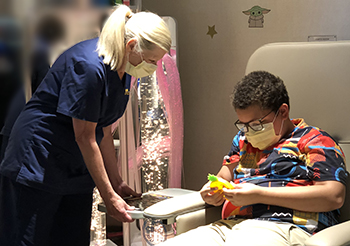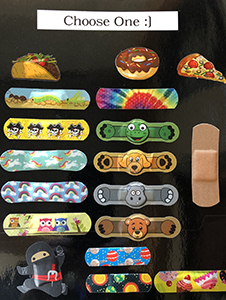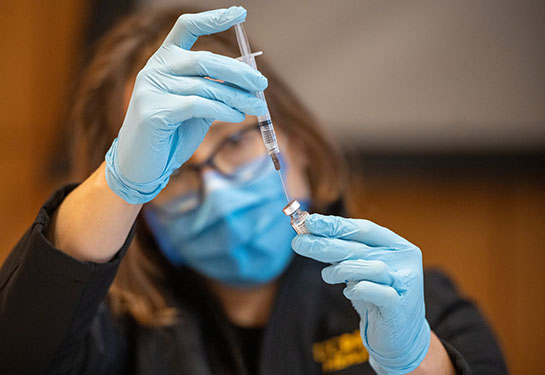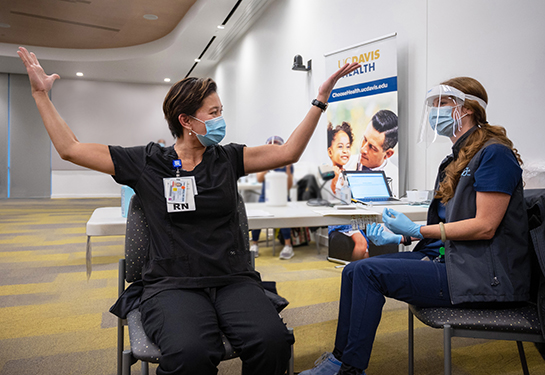New COVID-19 vaccine clinic for people with autism, other neurodevelopmental conditions (video)
UC Davis MIND Institute draws on expertise to provide calm, sensory-friendly experience for families
High quality B-roll and soundbites available for the media here.
This video is best viewed in Chrome, Firefox or Safari.
(SACRAMENTO, Calif.) — The UC Davis MIND Institute has launched a COVID-19 vaccine clinic, custom-designed for individuals with autism, Down syndrome, fragile X syndrome and other neurodevelopmental conditions.
The typical COVID-19 vaccine clinic – often a large, noisy space – can be overwhelming for children with these conditions, who often face anxiety and challenges with sensory overload. The new MIND Institute clinic offers the opposite experience.
“This clinic really focuses on quality rather than quantity,” explained Scott Akins, director of UC Davis Developmental-Behavioral Pediatrics and director of clinical programs at the MIND Institute. “We want to provide an inclusive, supportive experience for families, so we’re vaccinating three families per hour, which allows us to have three quiet rooms, an uncrowded waiting area and staff fully dedicated to each patient.”

13-year-old Freddie Miller plays with a pop-it toy before receiving his first COVID-19 shot, with the sensory machine in the background.
The COVID-19 clinic is open one day per week (Thursday or Friday), from 9 a.m. – 3 p.m. It’s available for all individuals with neurodevelopmental conditions and their family members, ages 5 and older, regardless of health care provider or insurance status.
Customized care for each patient
The clinic is being funded in part through a $68,000 grant from the Centers for Disease Control and Prevention to the MIND Institute’s Center for Excellence in Developmental Disabilities. It’s unique because child life specialists, trained in helping children with neurodevelopmental conditions cope with medical procedures, are involved at every step of the vaccination process.
“It’s really important that as child life specialists, we look at the development of the child, because you may have a 20-year-old who’s developmentally less mature, so we want to be able to prep them in a way that is matched to what they understand and need,” said Erin Roseborough, a child life specialist at the MIND Institute.
She and her colleagues contact the family of each patient who has an appointment beforehand to find out what the child’s needs and interests are. They also share information about what to expect, so that there are no surprises.
“We develop an individualized coping plan with the family ahead of their arrival,” explained Veronica Tuss, another child life specialist at the MIND Institute. “We provide preparation materials such as a social story, which is a step-by-step description, with photos, of what to expect at each stage of the appointment, starting in the parking lot.”
— Scott Akins
A sensory-friendly environment
Patients receive the COVID-19 vaccine in a room equipped with a comfortable chair and a large sensory machine that contains a calming tube of bubbles and can utilize lights, aromatherapy and a projector that displays images on the ceiling. Other sensory items available include squeeze balls and pop-it toys, and a big selection of unique bandages shaped like doughnuts, tacos, ninjas and more.
After being vaccinated, patients spend a 15-minute observation period in a quiet room. “This area is really important for our patients,” noted Akins. “Many children are dysregulated immediately after a blood draw or a vaccine.”
Child life specialists set the room up specifically to cater to each patient’s interests. “One recent patient was into art, so we had drawing supplies all set up for her and ready to go, and she colored the whole time,” said Roseborough.
Video games are also available, which was great news for 13-year-old Freddie Miller, who received his first Pfizer shot last week.
“I was kind of nervous getting the shot,” said Miller, who has autism and enjoyed playing with a yellow, pineapple-shaped pop-it toy while sitting in the vaccine chair. “It’s just a little bit of a pinch. It wasn’t that bad.”
Miller’s mom, Syerra Logan, was glad she brought him to the MIND Institute for his first vaccine dose. “I wanted a more controlled environment that wasn’t so chaotic for him. The loud noises can really trigger some of his anxieties and so I wanted to bring him here where it’d be a little more quiet and neutral,” she explained.
Miller picked out some applesauce for a snack while he played video games after the shot.

Patients can choose from a fun selection of bandages after their shot.
Logan, who is an ambulatory care administrative supervisor at UC Davis Health, was thrilled with the outcome. “It went amazing! He got a little bit nervous right before we started, but the rest of the process has been smooth,” she said. “It’s a relief to know he’s a bit more protected, especially when we’re going out, and I’m excited to get him the second one just to protect us a little bit more.”
Vaccination helps protect against COVID-19, and early research indicates that the vaccines may also help people from spreading the virus to others. The vaccine can also help keep people from getting seriously sick if they do contract COVID-19.
“Many families asked the question, ‘Have other individuals with autism or other neurodevelopmental disabilities had this vaccine and is this vaccine safe for people with my healthcare condition?’” said Akins. “That was a really common concern, and now six months into vaccinating, we do know that is it safe for all individuals, including those with autism and other neurodevelopmental disabilities.”
Learn more about how to make an appointment at the MIND Institute vaccine clinic. You can also call 916-703-5555.
The UC Davis MIND Institute in Sacramento, Calif. was founded in 1998 as a unique interdisciplinary research center where families, community leaders, researchers, clinicians and volunteers work together toward a common goal: researching causes, treatments and potential prevention of neurodevelopmental disabilities. The institute has major research efforts in autism, fragile X syndrome, chromosome 22q11.2 deletion syndrome, attention-deficit/hyperactivity disorder (ADHD) and Down syndrome. More information about the institute and its Distinguished Lecturer Series, including previous presentations in this series, is available on the Web at mindinstitute.ucdavis.edu.



